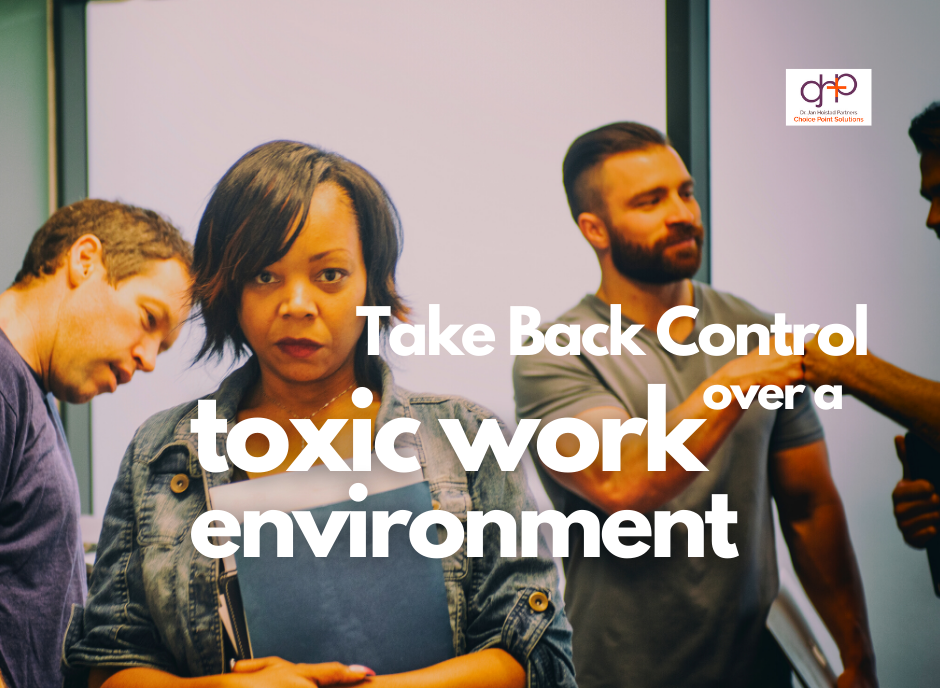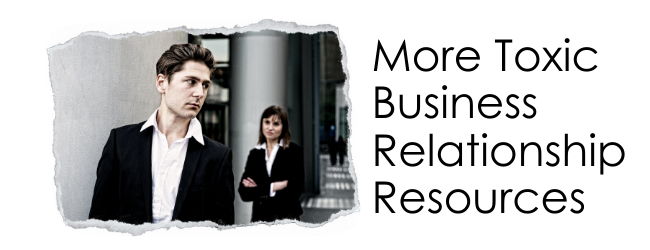
Over the past 35+ years, I’ve coached some pretty amazing, highly competent career coaching clients through difficult work relationships, into exit strategies if needed, and on to recovery from business or corporate PTSD (Post Traumatic Stress Syndrome.)
It happens all too frequently. I felt compelled to write some basic guidelines to help you through a tough circumstance.
We’ll break this article down into the following sections:
- Tips for Survival
- Identifying the Toxic Boss
- Acknowledging Narcissistic or Toxic Behavior
- Your Experience with a Toxic Situation
- How to Take Care of Yourself
- Healing Afterward
- Workplace Toxicity and Trauma
Tips For Survival
We often hear about ineffective employees. What about the lethal, abusive, toxic, or harassing boss, manager or co-worker? No matter how much money you are making, how prestigious the position or how high-paying the salary, being treated this way takes a huge toll on your energy and productivity, your psyche, and your soul.
There are few things worse for the human spirit than working all day at a job that you experience as boring or where you’re disengaged. Right up there is also if you’re spending hours in a negative environment. Experienced as even worse for the human psyche and soul is working with toxic or abusive people. Even if the abuse is not aimed “at” you, observing others being bullied, undermined, or maliciously being gossiped about or shunned—mean behavior—is a signal such behavior could always be turned on you. It sets people on high alert.
Who Is The Toxic Boss or Co-Worker?
If you frequently feel demeaned, undermined, over-looked or over-worked, harassed, bullied, or put down at work you most likely are working for a narcissistic, bullying, or toxic boss, supervisor, or manager. Or you are working with a co-worker who is getting away with such behavior, maybe hiding it well from superiors through “superior” performance.
Toxic, unkind people come in all shapes and sizes. They can be young or more mature, male or female. What makes them dangerous or lethal is they have little or no empathy, compassion, or concern for others. They appear to “enjoy” or thrive on intimidating others. They often reward those who “suck up” to them, those who buy into their view of reality, and those who work to meet their ends to “look good.”
Narcissistic or toxic leaders can “operate” overtly or covertly
They may intimidate or act abusively toward everyone under them. Or they will often zero in on one person or one person at a time: serial targets. Their direct level peers or those above them either seem oblivious to the behavior or they focus their attention only on what that leader brings into the company (e.g. revenue, contacts, contracts.) The narcissist or abuser may attack through out-and-out abusive or foul language, yelling, swearing, threats, and put-downs or through covert undermining and putdowns (e.g. giving inappropriate assignments, taking assignments away, and further along the continuum working to move an employee out of a job through HR investigations of complaints, putting the person on a plan, etc. Attacks may come in a group meeting or some target only in private one-on-one meetings—thus their targets are treated this way only when no one else is around to witness the behavior.
While the narcissistic boss can be male or female it seems men are more likely to intimidate in front of others. Women are more likely to undermine privately.
Often manipulative, always demeaning, sometimes verbally abusive. Sometimes the abuse is couched in seemingly nice or professional language or context. If you are targeted they often call for unnecessary meetings with you.
They undermine your person and/or your work product making you feel unnecessary or stupid.

Coaching to survive a narcissistic boss or toxic work environment is important for your mental health and planning to transition to a new job.
What You Experience
If you work in a toxic environment or have a narcissistic boss, here are some of the symptoms you may be experiencing. These symptoms often creep up so gradually that you may question your sanity, especially if you have a good work history and no past experience of harassment or self-doubts about your worth and value.
It can be especially confusing if you are the only employee who appears to be experiencing or suffering the consequences, or if upper leadership ignores the bad boss. While having co-workers confirm the toxic or abusive behavior does not ultimately make the work situation better, at least there is some validation for what you are experiencing.
Such a work environment is also very confusing because you want to learn and improve your skills which can make you vulnerable if you open up to criticism or critique of your work and receive the backlash and skewed perspective of a toxic boss.
Also, people in such a toxic environment often intuitively know it is wrong or abusive, however when you are in the middle of the situation and it deteriorates gradually and insidiously, it is easy to lose perspective on what is normal behavior. And especially, if you have an earlier history of any kind of abuse, please know you are even more vulnerable.
Please seek an outside “reality check” as soon as you realize you are experiencing the symptoms below for any period of time:
- You constantly question yourself and your decisions
- Your work future feels threatened
- You second-guess your every move
- You don’t feel like anyone “has your back” at work
- You feel “thrown under the bus” by co-workers who are trying to stay out of the limelight of the toxic or narcissistic boss
- You feel “little” or young whenever you have to deal with this person even when you are perfectly grown-up and professional
- You question your work capabilities, even if you’ve had years of good feedback and evaluation of your work in the past
- This toxic person says things that are totally the opposite of feedback you have received in the past (e.g. “You are a bad communicator.” “You don’t know what you are doing.” “You didn’t handle that right…or professionally……” Etc.)
- Your work environment feels “crazy-making” (e.g. you literally question your sanity, your view of reality)
- It is damaging your self-esteem; you feel worthless
- You feel trapped, helpless, or hopeless
- Your boss uses disrespectful language; may even call you names; is demeaning of your person and your capabilities and/or your work product
- Your boss yells at you frequently and acts like it’s okay
- You feel “in a bubble” Even without a history of anxiety or depression you feel continuously anxious, jittery, on-guard
- You experience panic attacks (like an elephant is sitting on your chest and you can’t breathe.)
- You’ve never had this before. You try to make yourself invisible so the boss won’t single you out
- You find yourself putting on an act or telling your boss whatever you think he or she wants you to say you worry constantly
- You can’t stop thinking about work
- You feel like whatever you do, it’s never enough
- You’re not eating properly
- You’re losing weight
- You don’t sleep well
- Your friendships are suffering
- Your marriage is suffering
- You have no energy; you’ve lost all joy
- You hate to go to work
- You used to enjoy, even love, your work
Take Care of Yourself
This is tricky territory because you do not want to make yourself more vulnerable to attack or undermining behavior on the part of the abusive boss. You also need to be savvy about the culture of the corporation or business environment you are in before you act to get help within the organization. They may or may not support you depending on their relationship with your particular boss, or depending on the culture of the entire company.
If you’re working in a corporation or business environment where you are underappreciated, undervalued, or out-and-out abused by a narcissistic, harassing, or bullying boss, manager, or co-worker, implement these guidelines because when you’re in an already unsafe situation it’s recommended not to make yourself more unsafe by becoming what I call a “lightning rod” for negativity.
“Implement these guidelines because when you’re in an already unsafe situation you DO NOT want to make yourself even more unsafe.”
-Dr. Jan Hoistad

So, below is a list of generic suggestions and guidelines not focused on your unique situation. Rather, the cautions apply to everyone, but get some coaching from an expert or wise counsel before you proceed to remedy your particular circumstance, especially if you wish to protect either your current job and/or your professional future.
Educate yourself on the topic. Read about toxic, narcissistic, abusive bosses, Google the topic. Talk to others. You are not alone.
Read the book The Wizard of Oz and Other Narcissists: Coping with the One-Way Relationship in Work, Love, and Family by Eleanor Payson. My professional coaching clients have found this and other books very helpful. Some leaders have shared and discussed with their direct reports if they are managing a group experiencing the toxicity and abuse of someone higher up in the organization.
Continue to learn more about the personality type you are confronting so you can remind yourself what you are experiencing is “real” and so you continue to gather ideas for self-care and how to proceed—whether you stay or want to create a plan to go.
Get help to develop self-talk strategies that keep you sane. Repeat after me…”I am not crazy. I am not crazy….I’m in a crazy-making situation. I’m in a crazy-making situation…” Repeat the above frequently throughout your day.
Contain the damage with good behavior. Do not badmouth or participate in gossip. Whether you are a leader or a team member I advise developing a strategy to “put a frame around it.” By that I mean spotlighting the focus you wish you and your people to maintain in the face of the adversity. It’s the message, the spotlight, the positive place to refocus energy, behavior, thoughts rather than focusing on the negative. For suggestions on how to “Frame It” go to my article and video here.
Do a good job. Remain professional and productive on the job. Focus on what you can do to be professional and stay adult – breathe, walk-off exercise off the feelings that come up
Have a mantra like the one I give all my clients: “How would a healthy normal adult behave in this situation if they were behaving with grace and dignity?”
Then practice those behaviors. Accept the fact that there are people like this on the planet, so instead of “OMG can you believe what he or she did or does….!” You accept that this is not healthy, normal behavior but pathological or a personality disorder or addiction of some kind. But these types live on the planet with us too, and it’s a lesson in getting educated and learning to take care of yourself, then stay away from such circumstances in the future (at least that would be my advice!)As long as you stay create a cushion around you and know it will have an emotional and psychological effect on you anyway. Create an exit strategy even if you do not know if you will choose to go.
You’ll feel better knowing you could go. Keep a list of your boss’s transgressions with dates and a little bit of information to tweak your memory if needed later. Do not keep this at the office. Get a bunch of reality checks from friends, mates, and professionals. For your inner reality check, make a list of what you know about your past performance feedback, etc. to clarify your “truth,” to sort fact from fiction, and to keep your head on straight. Hopefully, you can talk with a few safe fellow employees (or past employees are even better) but be careful. Do it outside of work and do not gossip.
Stay professional. And do not reveal any more than necessary unless these folks are truly your friends and you know their level of integrity. Stay “Adult.” Leave your “little wounded child” your “inner child” at home. Kids should not be at work anyway. Your adult self can deal with this situation, unpleasant though it may be. Do not confront your boss directly. Be neutral, try not to cry, be angry or show much emotion.
This can sometimes neutralize the boss but know it can also cause weird retaliations because some of the personalities like to cause pain or see intimidation. Please know that you probably have to leave the company. Know that your days are numbered and be the one to choose to go. Choose to work toward finding a better place to work – unless this boss retiring soon or leadership is aware and doing something about the bad boss. These actions must be sincere and strategic on the part of leadership, however. Don’t let yourself be strung along too long, but know that leadership is also working with the legalities of dealing with a person such as your boss.
Whatever you do proceed with a plan and get some outside career coaching and support. Especially if you do not know or are unsafe in your company culture. The company either supports the toxic boss, does not know about the behavior because it is so well-hidden or leadership chooses to remain blind. e.g. the company overlooks or excuses the behavior – typically because that person is a high monetary performer. Or they are unaware of the individual’s behavior because they are so sociopathic, narcissistic, and clever.
Again, and I hate to say it but until you know the position of the HR department in the company, I’d not run to them expecting them to necessarily protect you. Become educated by asking around, if possible to understand how HR operates in the particular culture of your company. (e.g. Does HR have a history of being effective, ineffective, helpful to employees, or punitive?)You are going to need to have coaching from an expert. Hire someone with experience working with business folks, who are versed about narcissism, addictions, pathology, and resulting PTSD.
You need outside alliances to keep your head on straight. You need someone not aligned with the organization who can help you handle what is currently going on while you stay on the job and who can help you find and sort through your options. You want someone who can help you make smart career choices while also taking care of yourself.)
You must take care of yourself and protect yourself. By that I mean you must do something. The long-term consequences for you to remain in the situation are too deadly to your psyche, self-esteem, and future. Get help to manage your feelings, anxiety, and potential depression. Your coach may be enough, but you may also need a therapist who is there for the emotional stuff sometimes.
Make friends with a good employment lawyer who can advise many do not charge until an action is taken. Follow exactly what they say to do, behave, speak document. Get that employment lawyer and follow their advice to a tee. If asked to document, do so in a private safe place. If HR is involved and safe, you may need to do what is called f HR “papering your file” to protect you in the future and to create a stream of documentation in case anything goes to court.
Aftermath & Healing
Know that for many months once you are out of that company or out from under that boss, you’ll question your responses and your reality. This is called Post Traumatic Stress Disorder or PTSD. You can heal. Get help. Don’t do it on your own. PTSD symptoms will arise under stress for some time. But remember, you are not crazy. You’ve been in an unhealthy, crazy-making position.
Seek support. Be determined to heal and move on in your career and personal life.

Recommended Approaches for Self Care When In a Toxic Work Environment or Experiencing Trauma Triggers include Safe Touch, Healing Body Work, EMDR, Therapy, Coaching, Breath Work, Meditation, Yoga, pets and others.
ADDENDUM: On Workplace Toxicity and Trauma
Toxic Environments and People Both Create and Re-Trigger Trauma and Stress Responses
I’ve been doing a lot of thinking that brings me to the larger topic of mental health that has been increasingly in the spotlight. As a result of events even in the past few years (including losses from the Covid, uncertainties brought about from lockdown measures and opening back up, unrest spawned from the very public death of George Floyd and many others, continuing gun violence, not to mention the “me too” movement, on-going political divides…. And the list goes on) we’ve come to experience a world filled with trauma. With high profile athletes and entertainers speaking out, taking time out, mental health is on everyone’s minds.
A beneficial aspect is a growing awareness of traumatic reverberations many people experience every day. Enlarging the conversation about mental health, wellness, self-care, healing and need for modalities and therapies—at all levels—is taking root. This is a good thing. It’s a necessary next step. But only a step.
So much more is needed, individually and as a society.
A destabilizing aspect of so many distressing events erupting out of the global landscape and seeping into view, is that for many people, toxic behavior triggers and re-traumatizes them.
An article from Wharton emphasizes the specific needs of certain groups, Black, Brown and others, who carry ancestral and intergenerational trauma. “Workplaces can actually compound trauma for minorities by not recognizing their unique struggles.” The same can be said for people whose traumas may be less obvious. These can be triggered by events and experiences that are unexpected, are well meant or appear harmless.
While some workplaces are incorporating more enlightened HR systems and some offer wellness programs or opportunities, this trend is not yet pervasive. So again it behooves each individual and group to raise awareness and take personal and collaborative action. For your own mental health. For those around you. The body of information about trauma, it’s many origins and manifestations, as well as how to heal it is there. It has not yet fully permeated our awareness, institutional response or massive health care funding. But the approaches and treatment modalities are known, many are well-researched and many are already available.
Counteracting Trauma
Raise Your Awareness
To heal one’s self and others, becoming conscious of the mental, physical, emotional and spiritual impacts is THE first step.
As of this writing I want to offer resources and 2 books that are accessible and very well researched. They pull a lot of information together in one place.
The very best comes from Bessel Van Der Kolk, M.D., a psychiatrist researching and treating trauma for many decades. He has written The Body Keeps The Score: Brain, Mind and Body in the Healing of Trauma. Deep and thorough, it’s a must-read for raising awareness of the pervasiveness of toxicity and trauma. It also hones in on the complexity of diagnosing and treating it’s manifestations. Van Der Kolk outlines pathways for healing.
Find a Safe Place
On your personal journey, working with a coach or therapist with special expertise in trauma is advised. Tiffany Johnson, assistant professor of organizational behavior at Georgia Tech’s Scheller College of Business and founder of the nonprofit Institute for Good Work cautions: “Choose a psychologist that you feel you can be safe with as culturally competent, who understands your professional background, your racial and ethnic complexities in a way that can really guide you and not induce more shame,” “Just because they’re a therapist doesn’t mean that they’re the best one for you.”
Self-Care Approaches and Treatments
The literature consistently returns to increasingly well-researched and culturally acceptable self-care. These are approaches to manage and heal the combination of body-mind-emotional responses to trauma that may be triggered. It’s important not only to use your wonderful intellect to gain information and understanding. The healing must also come through the body and emotions. The brain-body-emotions are interconnected and become miss-wired in the face of a traumatic event or being stuck in a persistent, unsafe, harmful environment.
Yoga, meditation and breathing techniques are abundantly available and practiced by many people every day. Research shows they can reduce the negative response and impacts. With expert help some methods also provide a cure.
If you wish to dive deeply into much that is known about breath work, I recommend James Nestor’s readable and informative Breath: The New Science of a Lost Art. His website has more information and access to videos on many forms of breath work to expand your options.
This is a start.
Again, take care of your Body-Mind-Spirit. Let’s keep learning more together about healing these very deep wounds. Let’s create safe space in our homes and workplaces.

ADDITIONAL HELPFUL READS FOR YOU
- Advice if You Have a Difficult Boss or Work in an Unsafe Environment
- How to Know if You Are A Lightening Rod For Negativity in a Toxic Work Environment
- How To Take Care of Yourself in a Toxic Environment
- Tips to Survive a Narcissistic Boss or Toxic Work Environment
Resources to Help Reflect on Creating a New Career Path
- My website Blog contains many articles, tips and suggestions to explore a career change or transition. This page includes those specific to the career transition topic, but feel free to look around and you may find others that are of help.
- Also, if you scroll down my FREE Articles webpage you’ll find 2 free downloadable Goal Setting Guides that will be helpful in setting goals and planning your next life and career move.
COACHING AND SUPPORT TO TRANSITION TO A BETTER POSITION
I hope these articles and resources have been helpful to you. If you are highly triggered, I recommend you reach out to a good therapist for support and to learn ways to manage your symptoms. If you need a referral please go to my calendar here and sign up for a 15 minute time slot. In the space provided, indicate that you are looking for a therapy referral. I will see if I can be of help.
Then when you are ready to explore career transition coaching, you may reach out for a Complimentary Conversation to explore your needs and how we might work together.
Contact Dr. Jan for a Complimentary call to discuss your needs here.
